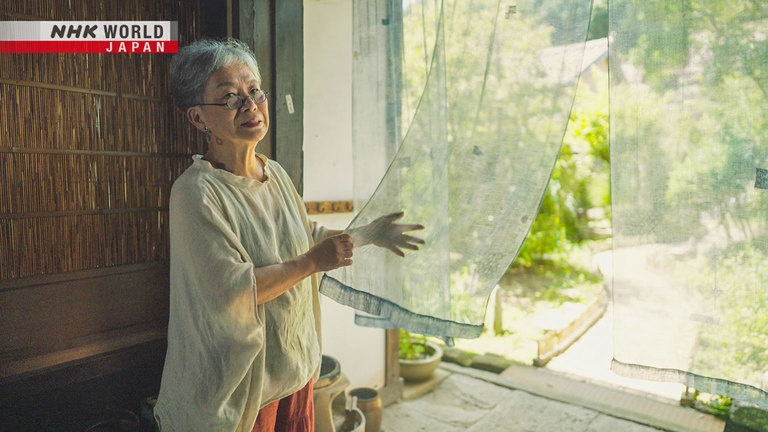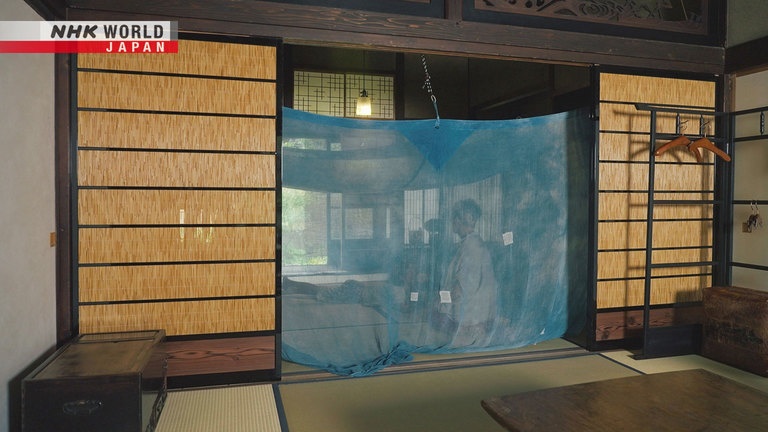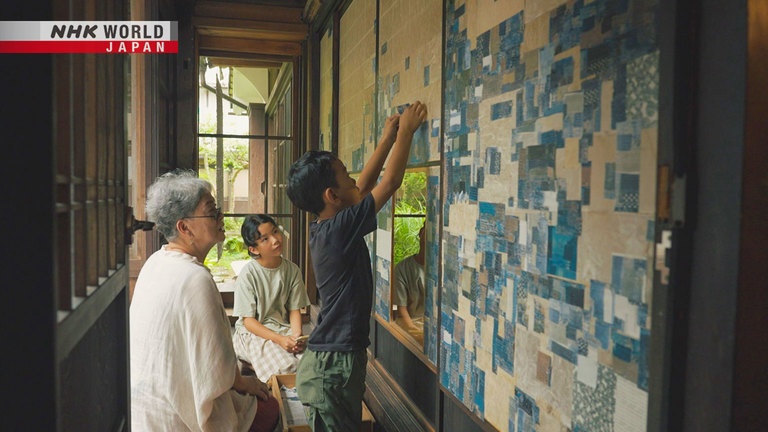Folk House 3: Thoughts of Summer
Folk house innkeeper Matsuba Tomi hosts her grandchildren in summer. After playing in the garden, they help clean and rest under the mosquito net. An old-fashioned way of life forms precious memories.



Transcript
Since ancient times, the Japanese have believed that a life force resides in all creations.
Valuing and caring for the things we use, a "Zero Waste Life."
Pointing the way to better living for a new era.
A small town in the San-in region of western Japan.
In this basin surrounded by mountains, the intense heat of summer persists.
The town is home to an inn run by Matsuba Tomi.
The inn itself is a renovated old folk house, built over 200 years ago, when Japan was still ruled by the samurai.
Houses like this are open
so the wind can pass through.
Back then, they came up with many
ways to allow for natural airflow.
The sheerness of the material lets you
see outside, giving a sense of coolness.
So, we always use this in summer.
It's so light that it billows in the wind,
and this also helps make you feel cool.
In old Japan, a home's arrangements and furnishings were changed to suit the season.
In summer, we change over to these
woven-reed sliding doors called "yoshido."
Their design allows for better airflow.
Long ago in summer, nearly all the doors
and windows were changed out for "yoshido."
But homes these days are tightly sealed
and airconditioned, so they're rarely used.
Come summer, in days gone by, mosquito nets like these were hung in nearly every home.
You spread them out like this,
and hang them around the room.
So, you can lay out your futon and sleep
with the doors and windows open.
Mosquito netting has also gradually disappeared from homes as Japanese lifestyles have changed.
I got them from someone
who no longer used them.
People just throw them away.
I got these screens the same way.
Someone just gave them to me.
All too often, such important, well-made
things are simply discarded.
I find it a little sad...
Things that go unused or are thrown away as the times have changed; here at the inn such items are used everywhere.
A day off at the inn.
Matsuba's grandchildren who live nearby have come for a visit.
You got water on me!
The children can't normally play here when there are guests.
Even water from inn's well is a source of fun.
Okay, stop!
But her grandchildren don't just play when they come to visit the inn.
They also help with the chores.
Wring it out well.
Yuko, you clean that corner.
I'll get it really clean over here.
That looks good.
After cleaning the next task is to repair torn sliding paper screens.
Normally, even if they get torn in only one spot, the entire surface is replaced.
Paste this over the tear.
Don't press too hard.
Yes, that'll do.
Okay, all done.
There's a tear over there too.
"Screens patched like this are pretty rare.
What do you think about them?"
They're pretty.
It's just done naturally,
but it comes out like art.
When I first saw them...
it was strange.
But the more I look at them,
the prettier they are.
And avoiding waste is a good thing.
Repairing torn screens with patches
makes them look nicer than new ones.
Humans can't help making mistakes.
But our mistakes help us to grow,
and allow us to do wonderful things.
That's something worth remembering.
Matsuba first moved into town in 1981.
After she and her husband married, they decided to live in his hometown.
At the time, Japan's economy was booming.
But this place, far from the city, was left behind, losing residents, and full of vacant homes.
A town forgotten by the times.
Through depopulation and aging,
it was turning into a ghost town.
But I loved it here from the start.
True, it's economically poor,
but this area is rich in nature.
And the relationships between
community members are warm.
These things were all still here.
That made it very appealing.
An old-fashioned way of life, unconcerned with the wealth of the city.
Her desire to share the joys of this kind of living inspired Matsuba to open her inn.
In the era I grew up in, efficiency
and economics were the top priority.
But I think if we reexamine the inefficient,
the values of the past,
we can have a better way of life.
Matsuba also teaches her grandchildren about the benefits of old-fashioned living.
Sit down and shake the netting
like this as you go in.
It keeps the mosquitoes out.
It's hard just to go in.
It's so open!
You sleep in here.
Oh?! Really?!
It's old, so it was torn, but
I sewed on these patches.
- It's pretty.
- It is nice.
Grandma, it's so breezy!
I want to sleep here!
It feels nice.
I wonder what I can give to
my grandchildren's generation.
I hope to leave them a better world,
if even just a little.
Thinking about that is what
inspires how I live now.
This life is what I want to give them.